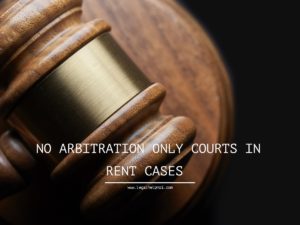 This is a case of a landlord and a tenant were tenant want the dispute to be settled out by way of arbitration instead of civil suit in the court of law as per the clauses mentioned in the lease deed agreement.
This is a case of a landlord and a tenant were tenant want the dispute to be settled out by way of arbitration instead of civil suit in the court of law as per the clauses mentioned in the lease deed agreement.
The landlord filed a civil suit seeking tenant’s eviction from the premises (shop)and for recovery of unpaid arrears of rent and grant of permanent injunction. The suit premises was leased out for a period of three years that stood expired and no fresh lease deed was executed thereafter between the parties for extension of the time period. After getting the notice of the civil suit, tenant filed an application under Section 8 of the Arbitration and Conciliation Act, 1996. According to the tenant, the lease deed contained an arbitration clause as per which the dispute must be resolved between the parties. Therefore the civil suit is not maintainable and barred to get such disputes resolved. Hence they must submit themselves to the jurisdiction of the arbitrator as per the lease agreement.
Both the Trial Court and the High Court dismissed the appeal of the tenant seeking for arbitration. The Supreme Court too rejected the application filed by the tenant under Section 8 of the Arbitration and Conciliation Act, 1996 and held that the civil suit filed by the landlord was maintainable. It was held that the disputes of such nature cannot be referred to the arbitrator. It was held that both the Courts below were right in dismissing the tenant’s application filed under Section 8 of the Arbitration and Conciliation Act, 1996 and thereby were justified in holding that the civil suit filed by the landlord was maintainable for grant of reliefs claimed in the plaint despite parties agreeing to get the disputes arising the reform to be decided by the arbitrator. The Delhi Rent Act, which deals with the rent and eviction proceedings, Section 3 of the Act is not applicable to certain premises but it does not mean that the Arbitration Act would, therefore, apply to such premises. The Court found no merit in the appeal, hence dismissed it and further directed the concerned Civil Court to continue the civil proceeding which was earlier stopped.
